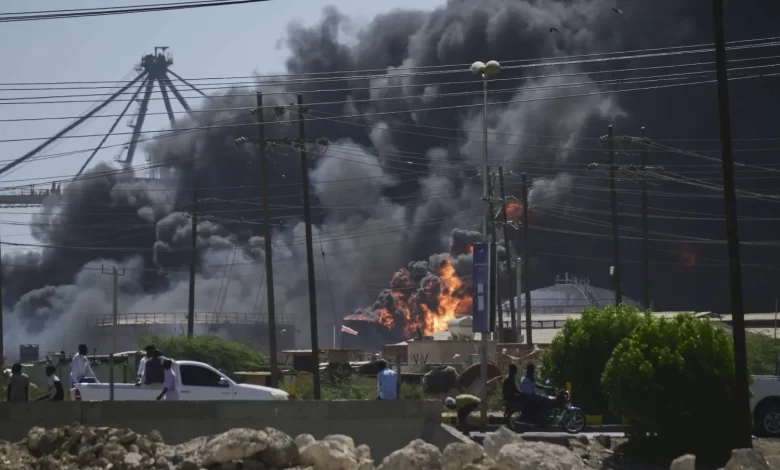“RSF” Intensify Use of Drones Against Army-Held Areas in Sudan

Sudan Events – Agencies
Army-controlled areas in eastern and southern Sudan came under renewed drone attacks on Thursday for the fifth consecutive day, the military announced, leading to a mass exodus of civilians from Port Sudan, the city serving as the government’s temporary headquarters.
The attacks targeted the main naval base near Port Sudan (east), as well as fuel depots in the city of Kosti (south), according to two army sources quoted by Agence France-Presse (AFP).
Referring to the “Rapid Support Forces” (RSF), a military source, who requested anonymity, said that “drones are once again attacking the Flamingo naval base north of Port Sudan.”
Explosions were heard in the area following the strikes. In recent days, drones have hit strategic sites in Port Sudan, which had largely remained untouched by the war that broke out in April 2023 between the army, led by General Abdel Fattah al-Burhan, and the RSF, led by his former deputy Mohamed Hamdan Dagalo, known as “Hemedti.”
The city, a hub for humanitarian aid and home to UN agencies and thousands of displaced persons, has been struck by drone attacks the army attributes to the RSF. The military claims the RSF is using “advanced strategic weapons” allegedly supplied by the United Arab Emirates, which denies the accusations.
The Flamingo base was similarly targeted on Wednesday.
Around 1,100 kilometers to the southwest, in Kosti in White Nile State (south), a military source said that “the RSF hit fuel depots supplying the state with three drones,” resulting in “fires breaking out.”
There were no reports of casualties.
No Choice But to Leave
Tuesday’s drone strikes damaged key infrastructure in Port Sudan, including the last functioning civilian airport in the country, a military base, a power station, fuel depots, and the country’s main port.
A military source stated that “air defenses shot down 15 drones last night and this morning that were targeting various locations in Port Sudan.”
At the city’s crowded main bus station, civilians were scrambling to flee.
Mahmoud Hussein, a bus company employee, said: “You can’t get a ticket now unless you book at least a day in advance. All the buses are full.”
Among those fleeing was Haidar Ibrahim, who was preparing to head south with his family.
He told AFP: “There’s smoke everywhere, and my wife has asthma,” adding, “we have no choice but to leave.”
Many of those fleeing had already been displaced multiple times, moving again as fighting approaches.
Transport costs have nearly doubled due to fuel shortages caused by the attacks.
Tuk-tuk driver Abdel Majid Babiker said: “We now have to buy fuel from the black market.”
On Wednesday night, witnesses reported drone flights and anti-aircraft fire over army-held areas in Kassala, northern Sudan.
The Intergovernmental Authority on Development (IGAD), a bloc of eight East African countries, called the attacks on civilian infrastructure in Port Sudan “unacceptable” and demanded they “stop immediately.”
IGAD Executive Secretary Workneh Gebeyehu said in a statement: “Any attack on this vital center will only increase people’s suffering and disrupt urgently needed aid delivery.”
The drone attacks raise fears that humanitarian aid to Sudan may be cut off. Famine has been declared in some areas, and around 25 million people are facing severe food insecurity.
Since April 2023, Sudan has been witnessing a deadly conflict between army chief General Abdel Fattah al-Burhan, de facto ruler since the 2021 coup, and his former deputy General Mohamed Hamdan Dagalo, commander of the RSF.
The conflict has resulted in tens of thousands of deaths and displaced 13 million people.
The Sudanese government, aligned with the army, accuses the UAE of supporting the RSF, an accusation Abu Dhabi denies.
On Tuesday, Khartoum declared the UAE an “aggressor state” and severed diplomatic ties. The UAE responded on Wednesday, stating it “does not recognize” the decision.
Following the RSF’s loss of military positions in Khartoum and central Sudan, it has increasingly relied on drones and long-range artillery, according to AFP.
The war has effectively divided Sudan between army-controlled areas in the center, north, and east, and RSF-controlled regions in the south and much of Darfur in the west.



